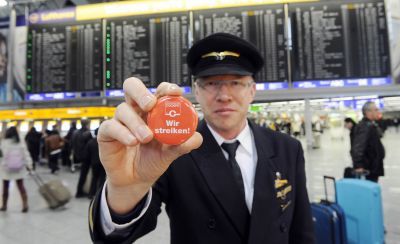French strike adds to European airlines' woes

European travellers faced more misery on Tuesday as French air traffic controllers launched a five-day strike and British and German airlines sought to head off threats of industrial action.
A quarter of flights from Paris Charles de Gaulle, a major international hub, were cancelled, along with around half out of Paris Orly, which mainly serves domestic routes and the French overseas territories.
Queues were building up at Orly, but most passengers were resigned to their fate as 17 flights flashed up "cancelled" on information screens. Air France has vowed to maintain most long-haul services during the strike.
The operators' association said some provincial airports, such as Pau, Biarritz, Grenoble, La Rochelle and Chambery, would close during the strike.
Four French unions have called the strike in order to protest against the planned merger of the Belgian, Dutch, French, German, Luxembourg and Swiss air traffic control networks.
French controllers fear the merger will end their protected role as French state employees, but the French aviation authority DGAC has insisted that its status will not be changed.
Beyond France, more widespread chaos was prevented, or at least postponed, late Monday, when German flag-carrier Lufthansa persuaded pilots to return to negotiations after only one day of a planned four-day stoppage.
Meanwhile, British Airways is facing the threat of a crippling protest after cabin crew voted by more than 80 percent in favour of new strike action, the fruit of a long-running and bitter dispute over working conditions.
British Airways, which has forecast a record loss in its current financial year, says it wants to review the working conditions of its cabin crew, who are paid more than their counterparts at other airlines.
The cabin crews' union, Unite, is angry at plans to use fewer crew on flights, freeze pay and apply different working conditions to new staff.
A total of 9,271 cabin crew voted, with 80.7 percent in favour of strike action, the union said. This allows for a strike within 28 days, but media reported that the busy two-week Easter holiday period has been ruled out.
"Our members are not mindless militants but men and women committed to their company and their profession, so it is right that they want to be consulted on changes to their jobs," said Unite assistant general secretary Len McCluskey.
"We will not allow Unite to ruin this company," the airline warned, in a statement. "Should a strike take place, we will do everything we can to protect our customers' travel plans as far as possible."
Lufthansa, Europe's biggest airline, said Tuesday it hoped to get services running normally by the end of the week as talks with unions got underway.
The firm agreed late on Monday to hold negotiations with the pilots' union Cockpit, ending a strike that was expected to last four days and cost the firm up to 100 million euros (136 million dollars).
"It will take some time to get the whole network functioning again," airline spokesman Klaus Walther told television station ZDF. "Our goal is to have the network running at 100 percent by Friday at the latest."
Walther said he was "optimistic" that talks would result in an agreement by March 8, the date unions have set as their next possible strike action, and Cockpit also welcomed the restarting of talks.
The union is pressing for a 6.4-percent pay raise but its main demand is that pilots would not lose their jobs when Lufthansa begins to operate more flights using cheaper foreign affiliates.
Lufthansa said it had flown 960 flights on Monday, just under half the scheduled number, but the predicted chaos at its Frankfurt hub did not materialise, as most passengers were forewarned and stayed away.
bur-dc/ss
Join our commenting forum
Join thought-provoking conversations, follow other Independent readers and see their replies
Comments
Bookmark popover
Removed from bookmarks